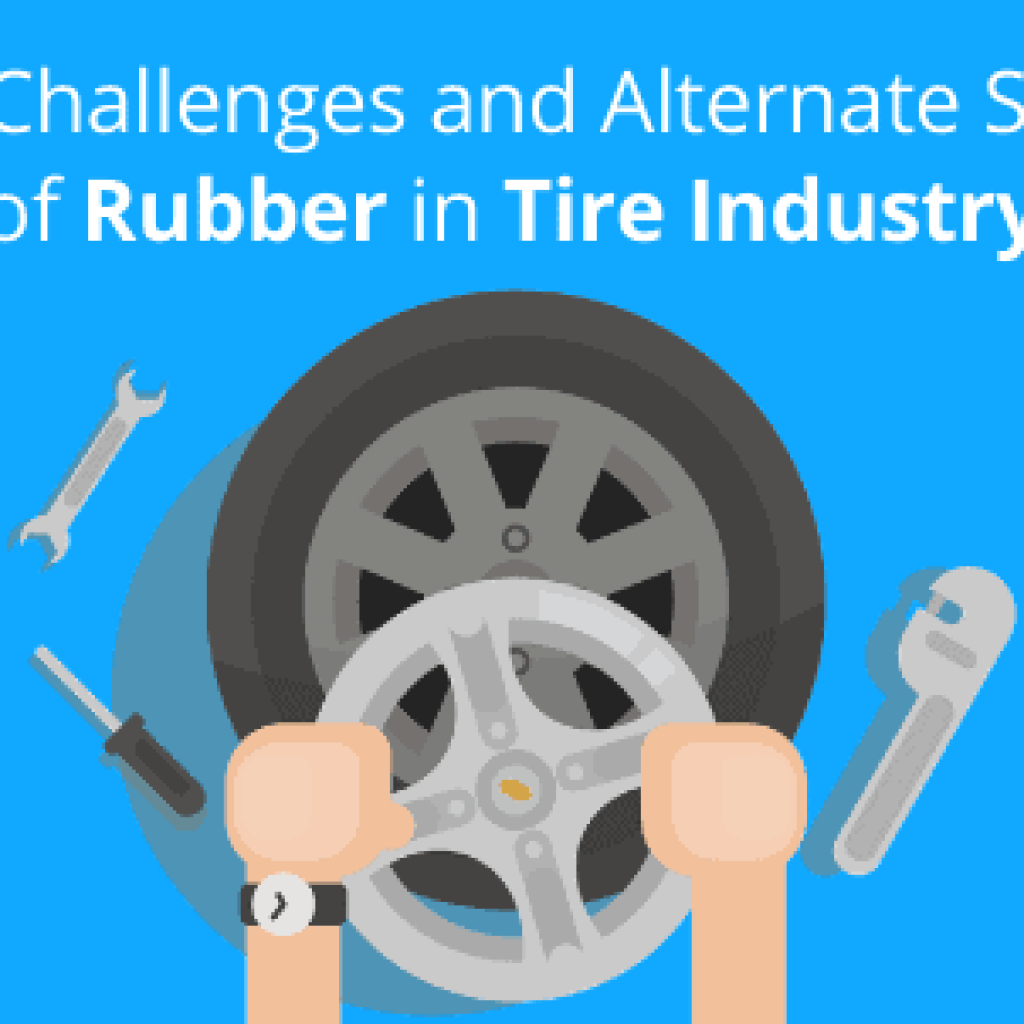With covid-19 and a decreasing global economy, the tire industry, along with many others, saw a steep volume decline in decades.
Source: Statista
In the supply chain, consumption of tire materials dropped in line with tire manufacturing, thus creating a decline in prices for natural and synthetic rubber and other key commodities.
Further, the pandemic has changed consumer patterns to a great extent, the reasons being work-from-home and e-commerce.
And finally, the R&D investment has been reduced to support other critical business functions.
But despite all this, R&D is still growing in the tire industry. Industry players and new emerging startups know that the key to weathering this storm or the likes of it is innovation.
While these companies and startups are working on innovation trends, we are trying to figure out, ‘where would these trends lead the tire industry?’
One of the trends is Smart Tire which is not only the focus of the tire manufacturing companies but emerging startups and tech companies as well.
The article focuses on 4 such innovation trends in the tire industry along with their advantages, their effect on the industry, and the companies working on them.
So, let’s start with the innovation trends in the tire industry.
1. Smart Tire
As per the Market Research Future report, the global automotive smart tire is expected to reach $160 billion with a growth CAGR of 18.5% by 2030. With such growth, tire manufacturers are focusing on R&D to take an upper lead in this battle. (Source)
Some companies are choosing other ways, such as collaboration or startup Acquisition, to achieve the goal.
For example, in Aug 2019, JK Tyre acquired Treel and with it, the company entered into the Smart tire competition. (Source)
So, these facts alone make it one of the important trends in the industry.
Benefits of Smart Tire
Vehicle Control Technique – One of the main benefits of smart tire systems is the enhancement of high-level vehicle control techniques. These are state estimators, agility and stability controllers, wheel slip controllers, active and semi-active suspension controllers, and individual wheel steering controllers. Smart tire systems can be used to improve both the vehicle development process and the performance of vehicle dynamics. (Source)
Unique Measurement Data – The sensors attached to tires collect information/data regarding tire pressure, temperature, and wear. This information is not just useful for passenger car drivers but is a fundamental enabler for autonomous driving. Sensors wirelessly transmit vital information about each tire to the vehicle’s main operating system and driver. Integrated centrifugal pumps automatically add air if necessary, optimizing pressure for each driving situation and providing critical top-ups if the air is lost. (Source)(Source)
How does the Smart Tire trend affect the industry?
Maximize Fuel Efficiency – Maintaining proper tire pressure saves fuel and increases mileage every time. It also reduces the risk of flat-spotting, increases responsiveness, protects against hydroplaning, and improves braking grip and directional stability. With the Silent Sensors tire management system, fuel consumption is optimized within the tire industry when the vehicle knows the ideal tire pressure for each situation. (Source)
Increased Tire Life – One can significantly extend the life of tires by properly managing them. When applied to a fleet of thousands of tires, this results in higher revenue retention for the business. Silent Sensors uses patented RFID technology to provide an efficient, simple tire management system at a low cost. It uses simple sensors to measure tire pressure, tread, and temperature, allowing fleet owners to better manage one of their most important resources. (Source)(Source)
New Technology Innovation – Numerous tire businesses have licensed smart tires and improved their performance as a result of technological advancements.
Companies/Startups Working On Smart Tires
Bridgestone – The Smart Strain Sensor technology developed by Bridgestone incorporates next-generation Internet of Things (IoT) technologies. The Smart Strain Sensor can measure the dynamic change in a strain that occurs when a tire is in use, in addition to tracking tire inflation pressure and temperature. The data collected by the Smart Strain Sensor is converted into tire load and wear information using a proprietary algorithm, which is then collected and sent to the cloud. (Source)
Smart Strain Sensor Technology
Goodyear Tire & Rubber – Goodyear’s SightLine solution run data from a sensor through proprietary machine-learning algorithms to capture tire wear, pressure, road-surface conditions, and other variables in order to forecast flats or other problems days in advance.
“SightLine could detect 90% of tire-related issues ahead of time in a test that involved about 1,000 vehicles operated by 20 customers.”
– Chris Helsel, Senior VP of Global Operations and CTO, Goodyear (Source)
Continental – Continental tires launched new sensors that will not only monitor pressure and air pressure but will also alert drivers to potential damage, poor tread, and temperature changes that indicate hazardous driving conditions. These tires are being developed in order to enhance fuel economy. (Source)
Important Note: There has been a lot of patent filing going on in this trend and tech companies seem to be a big part of it. The situation is similar to when we noticed tech companies’ patent filing in the smartwatch domain and then we witness the meteoric rise of tech companies in the smartwatch market and now they completely dominate it. Patent Landscape Study is one of the best strategies to figure out what companies are researching and at what stage they are now, so others can prepare for their invasion.
Contact us if you want to be prepared.
2. Digitalization
Much like the smart tire, this trend also includes tech companies seeking a stronghold. According to our exclusive report, Apple, IBM, Intel, and Qualcomm are some of the tech companies that are actively doing R&D in this space and even securing inventions via patents.
Moreover, many tire digitalization startups have emerged and now compete with traditional tire manufacturers and tech companies.
The involvement of tech players and a handful of startups working in this space showcase the importance of this innovation trend that benefits the tire industry.
Benefits of Digitalization
Improved Mass Production and Variations – With all data and accounting transferred to digital aids, the tire industry finds communicating, sharing, and locating the necessary data easier. Digitalization brings the tire industry simple, easy surfing, easy access, and fugacious work. Digitalization is required to achieve mass production and mass variations. Through this, companies will reallocate their resources while saving a lot of time, which will be used constructively on other critical aspects. (Source)
Expansion and Efficiency – Tire manufacturers require innovative concepts in tire design and manufacturing, enhanced production processes featuring increased automation, and more transparent production. Digitalization expands the tire industry in every way possible, allowing it to quickly scale operations, reduce downtime, and optimize speed and quality in tire production. (Source)(Source)
How does the Digitalization trend affect the industry?
Accelerating Production via Digitalization and IoT – The tire business is a relatively active industrial sector, and developments in automation inside tire production facilities can help to grow. Automation and digitalization are key drivers of the tire industry. Using IoT, data gathering of different floors, machines, and sensors will become easier. Further, using data from the factory floor and real-time information from the production machines, manufacturers can expand operational intelligence capabilities and more accurately manage machine utilization ensuring high-quality levels and machine efficiency.
“The digital transformation is showing that all tire producers and, as a consequence, their machine and technology suppliers have to face the risks and obstacles coming from the obsolescence of their production assets. Because of the deep digitalization, manufacturers need to build a modern, secure and reliable information infrastructure to connect assets with people and information flow.”
– Enzo Sorrentino, Global Enterprise Account Manager Ferrero of Rockwell Automation.
Companies/Startups Working On Digitalization in Tires
JK Tires – JK Tires invested to drive IoT-enabled digital transformation by connecting critical tire manufacturing processes. Mixing, calendaring, extrusion, cutting, winding, and curing were among the processes used. The resulting manufacturing process data lake was used for a more in-depth analysis of process quality and failure prediction using machine condition monitoring. With the company’s digital manufacturing platform powered by IoT and AI, the company is monitoring, measuring, analyzing, and predicting outcomes out of the box. (Source)
Apollo Tires – Apollo Tires has begun digitizing its IT infrastructure by moving it to Amazon Web Services (AWS). Apollo Tires will leverage AWS’s broad portfolio of services to create new customer experiences while increasing productivity, compliance, and process efficiency across all factories globally.
Apollo Tires will expand operational intelligence capabilities and more accurately manage machine utilization by using data from the factory floor and real-time information from production machines, such as tire rubber mixer machines, to ensure high-quality levels and machine efficiency. By digitally transforming with AWS, Apollo Tires will unlock productivity and efficiency gains in all factories globally, innovate new products and services faster, and enhance customer experience. (Source)
3. Sustainability
Sustainability is an ongoing trend for many industries, especially those responsible for heavy carbon emissions, the tire industry being one of ‘em. Also, after wear and tear, these tires end up in landfills, contributing to issues of soil deterioration and diminishing availability of space to continue such dumping. (Source)
These are enough factors for companies to choose sustainability.
A few goals to achieve sustainability include reducing raw material consumption and tire weight, improving the quality parameters, increasing the consumption of natural and renewable resources, and reducing the dependency on the resources of petroleum origin. Further, the industry is increasing its energy efficiency and reducing non-renewable energy sources.
Benefits of Sustainability
Resolving Environmental Issue of Disposal of Tire – Devulcanization is widely used to resolve the environmental issue caused by tire disposal. As one of the sustainable alternatives, sulfur-vulcanized natural rubber (NR) is mechanochemically devulcanized using a silane-based tetrasulfide as a devulcanizing agent.
The silica natural rubber composites are made by substituting 30% of the fresh NR with devulcanized NR with variable silica concentrations. When compared to fresh, natural rubber silica composites, the composites provide advantages to the tire industry due to their superior mechanical qualities, tear strength, abrasion resistance, and dynamic mechanical properties. (Source)
Reducing Energy Consumption – The rapid cross-linking of liquid farnesene rubber also benefits tire manufacturers. Its substantial co-reactivity ensures quick vulcanization. This enables shorter processing cycles, less energy consumption, and faster processing speeds. Liquid farnesene rubber’s unique properties enable the development of tires that minimize vehicle fuel consumption, generate less temperature, and safely bring vehicles to a halt even on icy ground. (Source)
How does the Sustainability trend affect the industry?
Sustainable Manufacturing by Reducing Environmental Footprints – All the members of the United States Tire Manufacturers Association (USTMA) are dedicated to sustainable manufacturing, which includes advancing safety through innovation, reducing environmental footprints, eliminating historical scrap tire stockpiles while growing economically and environmentally friendly scrap tire markets, increasing worker safety and being responsible corporate citizens. Tires are an important component of the automotive supply chain, and they contribute significantly to vehicle safety and fuel economy.
Through effective collaboration with stakeholders, the tire industry has reduced the number of scrap tires stored from nearly 1 billion in 1990 to about 67 million in 2015. Furthermore, tire producers continue to enhance scientific research on tire and tire materials in order to make the products more environmentally friendly.
All USTMA member businesses are involved in the World Business Council for Sustainable Development’s Tire Industry Project. The project aims to identify and address the potential health and environmental implications of materials used in tire manufacturing and usage. (Source)
Companies/Startups Using Sustainability in Tire Industry
Tyromer – Tyromer employs a process known as devulcanization to regenerate end-of-life rubber so that it can be remixed and reused in the production of new tires, allowing a truly circular economy in the tires and rubber industry.
Tyromer’s patented devulcanization technology continuously converts recycled tire rubber into Tire-Derived Polymer (TDP), using a supercritical carbon dioxide supported, thermal-mechanical extrusion process. The firm does not utilize any devulcanization chemicals or chemical solvents, and it transforms crumbs to TDP in less than 2 minutes. (Source)
4. Sustainable Material
A part of sustainability is to use sustainable materials in the tire-making process.
Tire manufacturers are now using soybean-based extender oils and silica produced from rice husks and will soon be using textile reinforcement derived from recycled plastic bottles made from PET.
Benefits of Sustainable Material
Reduction Of Energy Consumption – The tire industry also incorporates renewable resources in tire manufacture to provide longer-lasting products with a lower environmental effect. Some firms began by replacing rubber with synthetic rubber infused with silica. Silica in synthetic rubber aids in the replacement of rubber in tire treads, the reduction of rolling resistance or road friction, and the reduction of energy consumption while driving. (Source)
Improved Impact Resistance – Nylon Tire Cord Fabric offers unique characteristics and advantages in tires. These include strong breaking strength, superior impact resistance, outstanding adhesive strength, anti-fatigue strength, and good bearing performance. Such characteristics have a substantial influence on tire performance. (Source)
Companies/Startups Using Sustainable Material in Tires
Michelin – Michelin announced in March 2021 that by 2050, all of its tires would be exclusively created from renewable, recycled, bio-sourced, or otherwise sustainable resources. Michelin said it would continue to invest in its 6,000-strong global R&D team, as well as forge new relationships with other companies and entrepreneurs, to meet its 2050 target.
Michelin currently claims that 28% of the components used in its tires are made from natural, recycled, or otherwise sustainable raw materials.
According to the Company, “The developed technologies go well beyond the world of tires and could be used in other industries, enabling them to benefit as well from recovered raw materials that are infinitely reusable. These technologies will also make it possible to recycle polystyrene and recover carbon black or pyrolysis oil from used tires.” (Source)
Continental – Continental announced a development agreement with Pyrum Innovations, a specialist in the pyrolysis of used tires, in March 2022. The collaboration’s goal is to significantly improve and increase the recycling of used tires by pyrolysis.
Among the sustainable resources, recovered carbon black from Pyrum would be utilized in Continental tire manufacture in the future. Tire performance can be especially increased by employing high-quality carbon black. Continental aims to use 100% sustainably generated materials in its tire products by 2050 at the latest. (Source)
The pattern of partnerships and inventions by multiple large organizations shows that the organizations want to employ 100% sustainably generated materials in the tire industry by 2050.
Goodyear Tire & Rubber Company – In January 2022, the Goodyear Tire & Rubber Company unveiled a demonstration tire made with 70% sustainable materials, with 13 featured ingredients spread across nine different tire components, including three different carbon blacks derived from methane, carbon dioxide, plant-based oil, soybean oil to maintain tire pliability, silica to improve grip and reduce fuel consumption, and polyester, recycled from plastic bottles and used to make technical grade polyester suitable for tires. (Source)
Nokian Tyres – Nokian Tyres joined the Green Step concept in January 2022, offering a winter tire consisting of 93% recycled or renewable materials. All of the rubber utilized in the development of the Green Step idea is natural, as are the renewable oils such as canola oil and the plasticizers, resins, and processing aids generated from renewable sources. As the main filler for the tire’s tread and sidewalls, Nokian utilized natural rice husk ash silica and renewable cord fiber for added strength. (Source)
Conclusion
As the above trends suggest, the tire industry is moving towards a smart and sustainable future. While tech companies and startups are trying to get an edge over traditional tire companies, it is evident that the niche companies are ready to take them on and claim their share in the domain. Further, it’ll be interesting to see how the tire giants will collaborate with the startups and tech industry to lead the industry transformation.
Our exclusive report has further indications of where the niche tire manufacturers stand in the digitalization and sustainability of the tire industry. What other startups and tech companies are vying for the top spot with them?
To find out about them, read this next article on Tire Industry Research.
Authored by: Vipin Singh, Marketing










